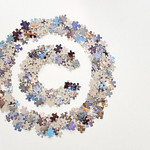After attending the Miami University Libraries' Copyright Conference in 2021, I was excited to attend it again this year. While my schedule didn't allow me to attend each one live, I'm thankful to be able to access the recordings and slides. I'll be writing up my notes over the next several days.
Like last year, the conference was hosted by Carla Myers and the 2022 conference was kicked off by John Millard, both of Miami University (Ohio). This year the event sponsors were:
The first session (Sept. 12) was "The Evolution of Copyright Librarianship: How we got here, and critical partnerships that help form our profession." (Yes, a super long title!)
Description:
...a discussion about how the profession of copyright librarianship emerged and the key role partnerships play in helping us effectively address copyright issues and considerations when offering services and resources to patrons.
Presenters:
- Jody Bailey, Emory University
- Kyle K. Courtney, Harvard University
- Kenneth D. Crews, Gipson Hoffman & Pancione
- Will Cross, North Carolina State Univ.
- Dave Hansen, Authors Alliance
My Summary:
- First - and this is no surprise - copyright education is important for library staff. We need staff to be trained so they can handle questions AND so they can support each other when questions arise. They also help support their colleagues at other institutions. Kyle Courtney refers to these folks as being hubs and spokes. You might also think of them as being a web of support.
- Second, there are many, many - many - opportunities for learning about copyright and fair use. This includes both low cost and free options. We need to better promote all of these options and help library folks take advantage of them. Libraries might want to consider a cohort model for this training, where learners would then become natural supports for each other.
- Third, the hiring challenges mentioned by Jody Bailey are important to understand. How do we get more people into library copyright positions? How do we prepare them for those roles? How do we create a web of support around them?
My Notes:
Crews noted the different ways copyright plays out in our organizations. He did this while introducing the speakers and their roles.
How did we get here? (Crews)
- Changes which took effect in 1978
- Fair use and statues
- Official guidelines and interpretations
- Policies and agreements
- New law caught our attention
- 1994: Technology and education
- First copyright office in an academic institution
- 1998: Confidence and solutions
- Conference on Fair Use
- Digital Millennium Copyright Act
- TEACH Act
- Copyright Term Extension Act
- Fair use was still an issue
- We were confident that we could find answers
Mass Digitization and Digital Access: The Litigation Years (Hansen)
- The technology (and fair use) revolution stated in the early 2000s
- 2002 Google book project began and organized library partners
- Google was sued in 2005 over this project (copyright infringement). Google believed what they were doing was legal under fair use.
- Google won the lawsuit
- 30+ million volumes are available in some fashion
- Began to see scanning of orphan works and the digitization of smaller collections
- Cambridge University Press v. Patton (2008) - are ereserves fair use?
- The publishers and authors went after academic institutions.
- Settled in 2020.
- Result? Yes, this work is fair use for classroom support.
- Authors Guild v. HathiTrust (2011). This case also broke the illusion that academic institutions would not be sued.
- A benefit has been improved accessibility
Integrating Copyright Librarians into System of Scholarly Communication (Will Cross)
- 2000s: Series crisis and author rights - a crisis of cost and publication agreements
- Copyright librarians needed to develop legal skills
- 2010s: Copyright as a the Foundation for Open Knowledge
- Copyright Librarians = Scholarly communications individuals
- Open knowledge, open access, open data, open communication, open licenses
- 2020s: Re-centering Copyright in Open Knowledge
- "Help me CC BY, you're my only hope!" This insufficient.
- Ongoing work: Information policy and advocacy - legal advocacy, policies, popular outreach
- Emerging work: Since we have lawyers handing around...there is work to be done!
Copyright First Responders National Program (Courtney)
- Role of libraries in copyright law
- Decentralized subject expertise
- Copyright First Responders
- Hub and spoke model
- Immersive learning environment
- Library & Archive-Focused Copyright Curriculum
- Practical curriculum
- Decentralized models
- Subject expertise
- Part of core values/mission
- Natural place for copyright questions to arrive
- Spokes - after learning - become hubs
- Layer a slice of copyright knowledge on top of a person's existing knowledge (subject expertise)
- Immersive, "safe space" learning environment - training and shared experience
- The hope is that people will become advocates for change
Tomorrow's copyright libraries: Who's in the pipeline? (Bailey)
- What's happening now?
- Hiring challenges
- Lots of openings - 9 universities in 5 months
- Must people be on-site? Can it be remote or hybrid?
- Why is hiring a copyright librarian so hard?
- Lack of transparency on salaries
- Unique positions
- Highly specialized skills possessed by only a few
- High levels of training and education required
- Not "sexy" or high profile?
- Perceived as only for wonks?
- The future How do we proceed?
- Make more training available
- Advocate to LIS programs and LLM/JM programs to add copyright coursework
- Promote continuing education
- Internal copyright training
- External mentoring/coaching
- Distribution of copyright duties

No comments:
Post a Comment